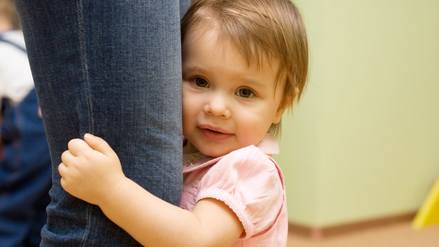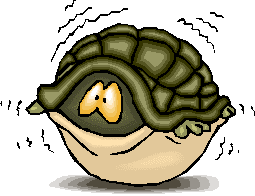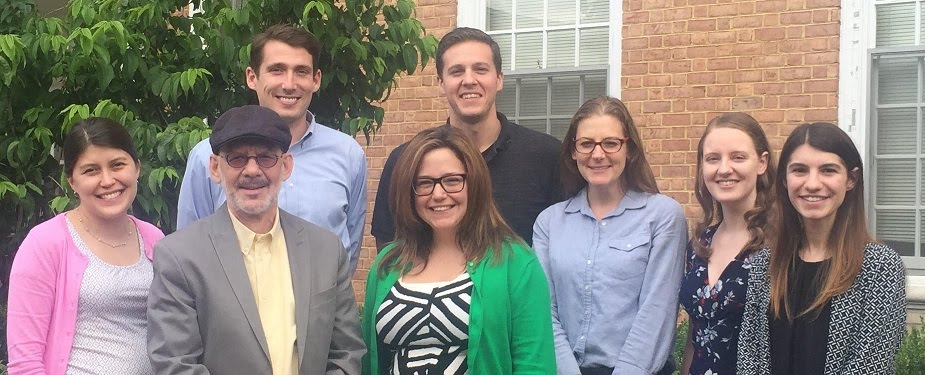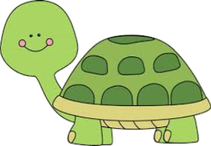Preschool Shyness Study
AboutIs your child very shy?Many children feel somewhat nervous when meeting unfamiliar people or encountering new situations. However, some children are so shy and nervous that it can hinder their ability to form meaningful relationships with peers and limits their participation in academics and extracurricular activities.
Drs. Andrea Chronis-Tuscano and Kenneth Rubin are conducting a National Institute of Mental Health-funded study examining two early intervention programs for shy children ages 45 to 64 months (3.5 - 5 years) and their parents. Research has found that both programs are effective in helping children feel less nervous in social situations. |
After four years of working with families, we have had 151 families participate in the study. We have also visited the many different preschools that the children attended to see how they play in their classrooms, allowing us to examine how each of the two intervention programs may have made a difference for the children and their parents. We recently completed a one-year follow-up interviews with families. We are excited to begin looking at the outcomes of the two treatments we tested!
Recent Publications
Chronis-Tuscano, A., Novick, D.R., Danko, C.M., Smith, K., Wagner, N.J., Wang, C.H., Druskin, L., Dougherty, L.R., & Rubin, K.H. (2022). Early intervention for inhibited young children: A randomized controlled trial comparing the Turtle Program and Cool Little Kids. Journal of Child Psychology and Psychiatry. 63 (3), 273-281. DOI: https://doi.org/10.1111/jcpp.13475
Rubin, K.H. & Chronis-Tuscano, A. (2021). Perspectives on social withdrawal in childhood: Past, present, and prospects. Child Development Perspectives.15 (3), 160-167. https://doi.org/10.1111/cdep.12417
Guedes, M., Matos, I., Almeida, T., Freitas, M., Alves, S., Santos, A.J., Veríssimo, M., Chronis-Tuscano, & Rubin, K.H. (2021). Perceptions of Portuguese parents about the acceptability of a multi-component intervention targeted at behavioral inhibition during early childhood. Infant Mental Health Journal, 42, 263–278. https://doi.org/10.1002/imhj.21900
Novick, D. R., Smith, K. A., Barstead, M. G., Danko, C. M., Rubin, K. H., Badders, R. N., Druskin, L., Dougherty, L., & Chronis-Tuscano, A. (2020). Predictors and moderators of parent engagement in early interventions for behaviorally inhibited preschool-age children. Evidence-Based Practice in Child and Adolescent Mental Health. 5, 452-467. DOI: https://doi.org/10.1080/23794925.2020.1784060
Guedes, M., Alves, S., Santos, A. J., Veríssimo, M., Chronis-Tuscano, A., Danko, C., & Rubin, K. H. (2019). Perceptions of Portuguese psychologists about the acceptability of a a child intervention targeted at inhibited preschoolers. Análise Psicológica, 3 (XXXVII): 371-390. doi: 10.14417/ap.1525
Guedes, M., Coelho, L., Santos, A. J., Veríssimo, M., Rubin, K. H., Danko, C., Chronis-Tuscano, A. (2019). Perceptions of Portuguese psychologists about the acceptability of a parent intervention targeted at inhibited preschoolers. Evidence-Based Practice in Child and Adolescent Mental Health, 4, 1-17. doi:10.1080/23794925.2018.1555443
Hastings, P. D., Rubin, K. H., Smith, K. A., & Wagner, N. J. (2019). Parents of socially withdrawn children. In M. Bornstein (Ed.), Handbook of Parenting. (3rd Edition). New York: Routledge. ISBN-13: 978-1138228788
Smith, K. A., Hastings, P. D., Henderson, H., & Rubin, K. H. (2019). Multidimensional emotion regulation moderates the relation between behavioral inhibition at age 2 and social reticence with unfamiliar peers at age 4. Journal of Abnormal Child Psychology, 47, 1239-1251. doi:10.1007/s10802-018-00509-y
Barstead, M. G., Danko, C. M., O’Brien, K. O., Coplan, R. J., Chronis-Tuscano, A., & Rubin, K. H. (2018). Generalization of an early intervention for inhibited preschoolers to the classroom Setting, Journal of Child and Family Studies, 27, 2943-2953. doi: 10.1007/s10826-018-1142-0
Chronis-Tuscano, A., Danko, C., Rubin, K. H., Coplan, R., & Novick, D. (2018). Future Directions for research on early intervention for young children at risk for social anxiety. Journal of Clinical Child and Adolescent Psychology, 47 (4) 655-667, doi: 10.1080/15374416.2018.1426006
Danko, C. M., O'Brien, K. A., Rubin, K. H., & Chronis-Tuscano, A. (2018). The Turtle Program: PCIT for young children displaying behavioral inhibition. In L.N. Niec (Ed.), Handbook of Parent-Child Interaction Therapy: Innovations and Applications for Research and Practice. (pp. 85-98). New York: Springer. ISBN: 978-3-319-97697-6
Rubin, K. H., Barstead, M. G., Smith, K. A., & Bowker, J. C. (2018). Peer relations and the behaviorally inhibited child. In K. Perez-Edgar & N.A. Fox (Eds), Behavioral Inhibition during Childhood and Adolescence. (157-184). Springer. ISBN: 978-3-319-98076-8
Rubin, K. H., Barstead, M. G., & Smith, K. (2016). Shyness in young children. In Couchenour, D. (Ed.). The SAGE Encyclopedia of Contemporary Early Childhood Education. (pp. 1221-1225). Thousand Oaks, CA: Sage. ISBN: 9781483340357. doi: 10.4135/9781483340333.n364
Root, A., Hastings, P., & Rubin, K. H. (2016). The parenting behaviors of shy-anxious mothers: The moderating role of vagal tone. Journal of Child and Family Studies, 25, 1325-1333. doi: 10.1007/s10826-015-0296-2
Chronis-Tuscano, A., Rubin, K. H., O’Brien, K. A., Coplan, R. J., Thomas, S. R., Dougherty, L. R., Cheah, C. S. L, Watts, K., Heverly-Fitt, S., Huggins, S. L., Menzer, M., Schulz Begle, A., & Wimsatt, M. (2015). Preliminary evaluation of a multi-modal early intervention program for behaviorally inhibited preschoolers. Journal of Consulting and Clinical Psychology. 83(3), 534-540. doi: 10.1037/a0039043
Chronis-Tuscano, A., Novick, D.R., Danko, C.M., Smith, K., Wagner, N.J., Wang, C.H., Druskin, L., Dougherty, L.R., & Rubin, K.H. (2022). Early intervention for inhibited young children: A randomized controlled trial comparing the Turtle Program and Cool Little Kids. Journal of Child Psychology and Psychiatry. 63 (3), 273-281. DOI: https://doi.org/10.1111/jcpp.13475
Rubin, K.H. & Chronis-Tuscano, A. (2021). Perspectives on social withdrawal in childhood: Past, present, and prospects. Child Development Perspectives.15 (3), 160-167. https://doi.org/10.1111/cdep.12417
Guedes, M., Matos, I., Almeida, T., Freitas, M., Alves, S., Santos, A.J., Veríssimo, M., Chronis-Tuscano, & Rubin, K.H. (2021). Perceptions of Portuguese parents about the acceptability of a multi-component intervention targeted at behavioral inhibition during early childhood. Infant Mental Health Journal, 42, 263–278. https://doi.org/10.1002/imhj.21900
Novick, D. R., Smith, K. A., Barstead, M. G., Danko, C. M., Rubin, K. H., Badders, R. N., Druskin, L., Dougherty, L., & Chronis-Tuscano, A. (2020). Predictors and moderators of parent engagement in early interventions for behaviorally inhibited preschool-age children. Evidence-Based Practice in Child and Adolescent Mental Health. 5, 452-467. DOI: https://doi.org/10.1080/23794925.2020.1784060
Guedes, M., Alves, S., Santos, A. J., Veríssimo, M., Chronis-Tuscano, A., Danko, C., & Rubin, K. H. (2019). Perceptions of Portuguese psychologists about the acceptability of a a child intervention targeted at inhibited preschoolers. Análise Psicológica, 3 (XXXVII): 371-390. doi: 10.14417/ap.1525
Guedes, M., Coelho, L., Santos, A. J., Veríssimo, M., Rubin, K. H., Danko, C., Chronis-Tuscano, A. (2019). Perceptions of Portuguese psychologists about the acceptability of a parent intervention targeted at inhibited preschoolers. Evidence-Based Practice in Child and Adolescent Mental Health, 4, 1-17. doi:10.1080/23794925.2018.1555443
Hastings, P. D., Rubin, K. H., Smith, K. A., & Wagner, N. J. (2019). Parents of socially withdrawn children. In M. Bornstein (Ed.), Handbook of Parenting. (3rd Edition). New York: Routledge. ISBN-13: 978-1138228788
Smith, K. A., Hastings, P. D., Henderson, H., & Rubin, K. H. (2019). Multidimensional emotion regulation moderates the relation between behavioral inhibition at age 2 and social reticence with unfamiliar peers at age 4. Journal of Abnormal Child Psychology, 47, 1239-1251. doi:10.1007/s10802-018-00509-y
Barstead, M. G., Danko, C. M., O’Brien, K. O., Coplan, R. J., Chronis-Tuscano, A., & Rubin, K. H. (2018). Generalization of an early intervention for inhibited preschoolers to the classroom Setting, Journal of Child and Family Studies, 27, 2943-2953. doi: 10.1007/s10826-018-1142-0
Chronis-Tuscano, A., Danko, C., Rubin, K. H., Coplan, R., & Novick, D. (2018). Future Directions for research on early intervention for young children at risk for social anxiety. Journal of Clinical Child and Adolescent Psychology, 47 (4) 655-667, doi: 10.1080/15374416.2018.1426006
Danko, C. M., O'Brien, K. A., Rubin, K. H., & Chronis-Tuscano, A. (2018). The Turtle Program: PCIT for young children displaying behavioral inhibition. In L.N. Niec (Ed.), Handbook of Parent-Child Interaction Therapy: Innovations and Applications for Research and Practice. (pp. 85-98). New York: Springer. ISBN: 978-3-319-97697-6
Rubin, K. H., Barstead, M. G., Smith, K. A., & Bowker, J. C. (2018). Peer relations and the behaviorally inhibited child. In K. Perez-Edgar & N.A. Fox (Eds), Behavioral Inhibition during Childhood and Adolescence. (157-184). Springer. ISBN: 978-3-319-98076-8
Rubin, K. H., Barstead, M. G., & Smith, K. (2016). Shyness in young children. In Couchenour, D. (Ed.). The SAGE Encyclopedia of Contemporary Early Childhood Education. (pp. 1221-1225). Thousand Oaks, CA: Sage. ISBN: 9781483340357. doi: 10.4135/9781483340333.n364
Root, A., Hastings, P., & Rubin, K. H. (2016). The parenting behaviors of shy-anxious mothers: The moderating role of vagal tone. Journal of Child and Family Studies, 25, 1325-1333. doi: 10.1007/s10826-015-0296-2
Chronis-Tuscano, A., Rubin, K. H., O’Brien, K. A., Coplan, R. J., Thomas, S. R., Dougherty, L. R., Cheah, C. S. L, Watts, K., Heverly-Fitt, S., Huggins, S. L., Menzer, M., Schulz Begle, A., & Wimsatt, M. (2015). Preliminary evaluation of a multi-modal early intervention program for behaviorally inhibited preschoolers. Journal of Consulting and Clinical Psychology. 83(3), 534-540. doi: 10.1037/a0039043
The Preschool Shyness Study Team



